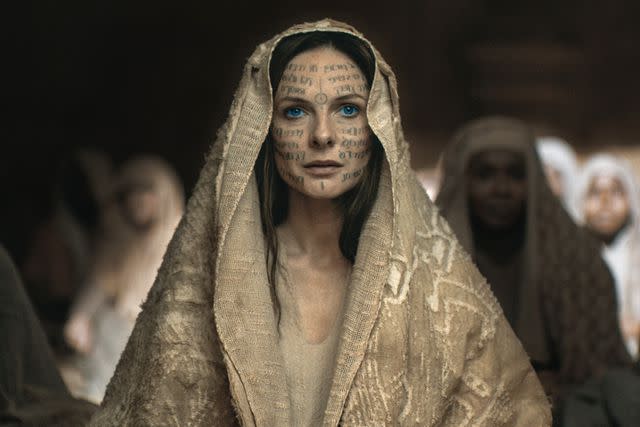How “Dune: Part 2” handles the character of Alia — and why there isn't a time jump
- Oops!Something went wrong.Please try again later.
- Oops!Something went wrong.Please try again later.
- Oops!Something went wrong.Please try again later.
Denis Villeneuve explains why [SPOILER] only appears briefly, and why he decided to compress the story's timeline.
Warning: This article contains major spoilers from Dune: Part Two.
As Dune: Part Two revved up in early 2022, fans were hit with a flurry of high-profile casting announcements: Florence Pugh as Princess Irulan! Christopher Walken as the Emperor! Austin Butler as Feyd-Rautha! These were all important characters from Frank Herbert’s 1965 novel Dune who did not appear in director Denis Villeneuve’s first film. But they weren’t the only ones.
Missing from these castings was Alia of the Knife, the younger sister of Paul Atreides (Timothée Chalamet) who plays a big part in the last act of Herbert’s Dune and its sequel novels. It was doubly surprising because Alia’s arrival is hinted at in the 2021 Dune, when Paul psychically senses that his mother Lady Jessica (Rebecca Ferguson) has gotten pregnant again.
But Alia presents some challenges for an adaptation. She is only a few years old at the end of Herbert’s novel but wise beyond her years — so much so that the Bene Gesserit refer to her as an “abomination.” You could cast a child actor in the role, as David Lynch did with Alicia Witt in his 1984 Dune film, but it’s a sophisticated part that requires violence and intelligence. But no child castings were announced. For a minute there, this EW reporter wondered whether Villeneuve and his team might take an innovative approach to the character, like using a puppet of some kind to capture her unique mix of youth and wisdom. Instead, the director decided to compress the story’s timeline.

Warner Bros. Pictures
Rebecca Ferguson in 'Dune: Part Two'Alia does appear in Dune: Part Two, but only briefly, and in a dream at that. During one of Paul’s visions of the future, he speaks to a grown-up version of his sister, played by Anya Taylor-Joy. Yes, that’s why the Furiosa actress has been attending some red carpets for the film: She plays an important character! But the role is so small, and so secret, that Taylor-Joy’s name does not even appear in the film’s closing credits.
“I was deeply happy with the fact that Anya accepted this challenge of playing a ghost and a secret,” Villeneuve tells Entertainment Weekly. “I cannot believe that we kept the secret that long. It required so much work to keep that secret. Everybody signed with their blood.”
But Alia does not appear in the present-day reality of Dune: Part Two, because the action progresses much faster than it does in the book. This was a deliberate storytelling choice by Villeneuve, both to increase drama and to convey the unique nature of Alia’s birth.
Paul is not the only Atreides who learns things from the Fremen, after all; his mother also undergoes a transformation in the desert. By drinking the Water of Life (a poisonous blue substance created by drowning a sandworm), Jessica ascends to the status of a Reverend Mother of the Bene Gesserit — which means she acquires all the knowledge, memories, and personalities of Reverend Mothers who came before her. Because Jessica does this while secretly pregnant (something that is supposed to be forbidden), that transformation extends to Alia as well. So the child is born with the wisdom not just of an old woman, but with thousands of them. Even before Alia is born, she can communicate with Jessica — and with Paul, as we see in the film.
“It came out of screenwriting discussions with Jon [Spaihts], when we were trying to figure out how to increase tension and create more momentum in the story,” Villeneuve explains. “To put more pressure on Paul, we decided to compress time. We had this idea that we could create the feeling of the progression of time through Jessica's pregnancy. I thought this was really fresh and original to have a character who is pregnant and still a powerful woman, a central figure of the story. I don't remember having seen that, especially in a sci-fi movie, and it gave me the opportunity to develop ideas that were in the book. Having her talk to her fetus was a way to illustrate the power of the Water of Life, this substance that gives you access to the past lives of previous Reverend Mothers. It was a way to more precisely express how Alia becomes this abomination.”
Villeneuve continues, “When we had this idea, it was like an epiphany for me. It was one of the final bricks of the screenplay. I don't know how the fans will react, because it's a strong curve that we took, but I felt that it was very close to the spirit of the book. I'm very happy with this idea.”
Might we see more of Alia down the line? Villeneuve certainly hopes so. After all, she becomes an even more important character in Herbert’s sequel, Dune Messiah, which the director has already said he wants to adapt as well.
“I love her,” Villeneuve says of Taylor-Joy. “I would love to make Dune Messiah just to work with her and Florence more. Those actresses are so inspiring. They give me chills and the will to do another one.”
Dune: Part Two is in theaters now.
Want more movie news? Sign up for Entertainment Weekly's free newsletter to get the latest trailers, celebrity interviews, film reviews, and more.
Related content:
Read the original article on Entertainment Weekly.

